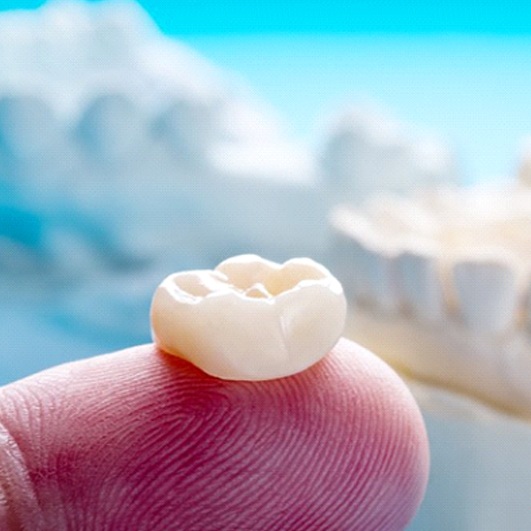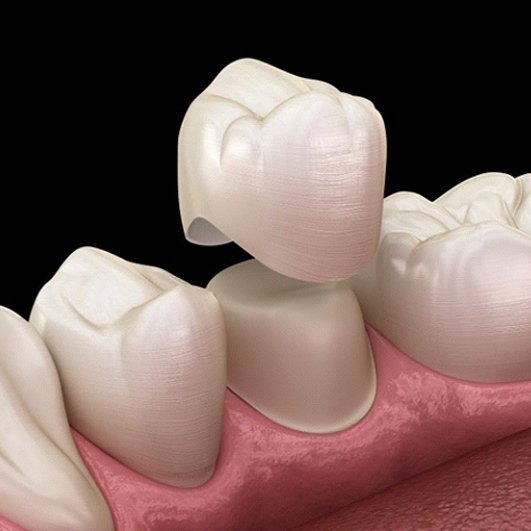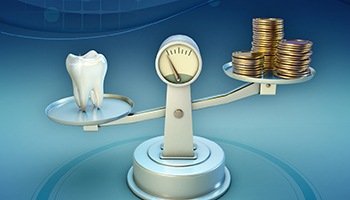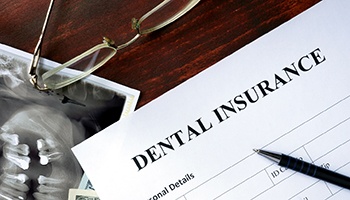
Dental Crowns – Eatontown, NJ
A Lifelike Solution for Protecting Damaged Teeth
If you have a broken or worn-down tooth, then you already know how hard it can feel to let the world see your smile. Not to mention, chewing with that tooth might be uncomfortable. These days, you no longer have to get a chunk of metal placed over tooth to restore its health and function; at NU Dental Eatontown, we can provide dental crowns made from tooth-colored ceramic. These natural-looking restorations make your tooth look and feel like it had never sustained any damage in the first place. Don’t wait any longer to get your broken tooth repaired – contact us today to schedule a consultation with Dr. G for dental crowns in Eatontown, NJ!
Why Choose NU Dental Eatontown for Dental Crowns?
- Digital Dental Impressions – No Messy Putty Required!
- Same-Day Emergency Dental Appointments Offered
- Dental Sedation Options Available for Anxious Patients
What Is a Dental Crown?

A dental crown is a thin, tooth-shaped “cap” designed to fit snugly over the entire section of a tooth that you can see above the gumline. This part of the tooth is known as the crown, which is where dental crowns get their name. Once a crown has been placed, it restores the tooth’s original structure and brings it back to full chewing function. It also protects the tooth from additional damage, preserving it for years to come.
In the old days, dental crowns were made from metals like silver and gold. Although these materials are durable, they weren’t exactly cosmetically pleasing. That’s why your dentist in Eatontown, NJ offers dental crowns made from lifelike ceramic. Not only are ceramic crowns often just as durable as metal crowns, but they can be uniquely designed to blend in with the rest of your pearly whites.
The Dental Crown Process

We can typically design, create, and fit your dental crown in just a couple of appointments over the course of a few short weeks. First, Dr. G prepares the tooth in question by gently reshaping the enamel, ensuring there is plenty of room for the crown to sit flush. Then, our team takes digital, goop-free impressions in order to create a mold that our partnered dental lab uses to design your crown. While they get to work, you’ll wear a temporary crown to protect your tooth in the meantime. A few weeks later, you’ll return to our office to have your temporary swapped out for your permanent crown.
The Benefits of Getting a Dental Crown

As a versatile and popular dental treatment, dental crowns can help you in many ways. For example:
- Your crown will be custom-made to mimic the surrounding teeth, guaranteeing seamless results.
- By covering your damaged tooth, you’ll be able to chew without discomfort.
- The tooth will be shielded from further damage, potentially saving it from having to be extracted.
- A dental crown can easily last for 10 to 15 years if you care for it with regular brushing, flossing, and dental checkups.
Understanding the Cost of Dental Crowns

A dental crown can keep your damaged tooth safe and looking great for many years into the future. However, you may be concerned about the cost of your new restoration. We won’t be able to determine the exact cost of your dental crown until we see you in person. In the meantime, here are some things for you to take into consideration.
Factors that Affect the Cost of Dental Crowns

Several different factors determine the cost of dental crowns. Here are the most prominent ones that are considered:
- Severity of Damage: If your tooth is very damaged, you may need other treatments in addition to a dental crown. For instance, if your tooth is infected, you may need to have a root canal before you have your crown placed.
- Materials Used: Dental crowns can be made from many different materials, and they are all different price points.
Does Dental Insurance Cover Dental Crowns?

Dental crowns are considered to be a major procedure by most dental insurance companies, so they are generally covered by about 50%. However, every plan is different, so it’s always a good idea to check with your provider ahead of time so you don’t run into any surprises. We would also be happy to help you with this. If you need any assistance understanding how your plan works, don’t hesitate to reach out.
Other Options for Making Dental Crowns Affordable

If you don’t have dental insurance, this doesn’t mean you are out of luck. With our in-house Dental Membership Plan, you can save on treatments completed at our practice. We also accept payments through CareCredit – a third-party financing company that can split the cost of your treatment into manageable monthly installments with little to no interest. To learn more about your financial options, feel free to talk to one of our friendly team members.
Dental Crowns FAQs

Are you considering restoring severely decayed or damaged teeth? If so, then you’ll likely want to get dental crowns in Eatontown. They can provide the superior protection and structure your natural pearly whites need to look and feel strong again. That said, you may be curious to know more about the treatment before committing to any work. Our team at NU Dental is more than happy to compile some of the most common questions we get about dental crowns. This way you can feel confident and well-informed about your restoration treatment. Read on or give us a call today if you wish to learn more!
Do Dental Crowns Get Cavities?
Dental crowns are not made of the same organic material as your natural teeth, so you won’t expect yours to develop cavities. However, your underlying tooth can still be susceptible to bacteria and decay. In fact, those that are crowned are just as vulnerable as uncrowned ones. For this reason, you’ll need to maintain proper oral hygiene. This will involve rinsing with ADA-approved mouthwash often, flossing once daily, and brushing for two minutes twice a day, especially around your gum line and the base of your crown.
Are Dental Crowns Permanent?
While dental crowns are an effective and durable solution to restore your smile, they won’t be permanent. The only irreversible aspect of your treatment is that your natural tooth will need to be prepared for your restoration. This process will involve altering the enamel so that the crown will fit properly. Once this material is removed, it won’t grow back on its own, so your tooth will need to be protected by a dental crown going forward. By practicing good oral hygiene, sticking to a healthy diet, and visiting our team regularly for checkups, your results can last 5 to 15 years!
Is It a Dental Emergency If Your Crown Falls Off?
Although a dental crown falling out isn’t always an emergency, you’ll want to contact our staff and schedule an appointment within a few days. This is especially necessary if your underlying tooth has sharp or jagged edges that can damage your soft oral tissues like your tongue and cheeks. Until you can see us, make sure to apply dental wax or even sugar-free gum over the area for protection. Be careful not to chew or bite on that side of your mouth as well. While we might be able to bond your crown to your tooth again, we may have to replace it with a new one if it’s severely damaged.
Are Dental Crowns Safe for MRI?
Since our dental crowns are made out of porcelain, they won’t affect the magnetic resonance imaging (MRI) process. If you have metal or porcelain-fused-to-metal ones, however, then you’ll need to inform your dentist, doctor, and MRI technician before getting an MRI. Sometimes the metal can disrupt the magnetic field or radio waves in the device, warping the image and interfering with your diagnosis. This may be a good reason to transition to a metal-free dental crown, as it can reduce any risks or disturbances if you require an MRI.